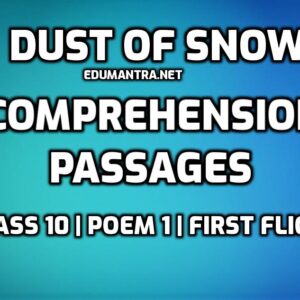
Dust of Snow
By- Robert Frost
COMPREHENSION OF STANZAS
Read the following stanzas and answer the questions that follow :
STANZA 1
The way a crow
Shook down on me
The dust of snow
From a hemlock tree
Questions :
(a) What did the crow do to the hemlock tree?
(b) What was there in the tree at that time?
(c) Where do you think was the poet then?
(d) What is the name of the poem?
(e) What is the name of the poet?
(f) Write the rhyming words.
Answers :
(a) The crow shook the hemlock tree.
(b) There was snow in the tree at that time.
(c) Then the poet was under a hemlock tree then.
(d) The name of the poem is ‘Dust of Snow’.
(e) The name of the poet is Robert Frost.
(f) crow – snow me – tree
[pt_view id=”96b40e72ic”]
STANZA 2
Has given my heart
A change of mood
And saved some part
Of a day I had rued.
Questions :
(a) What had given the poet ‘a change of mood’?
(b) What had the poet thought of that day?
(c) How was some part of the day saved for the poet?
(d) Name the poem.
(e) Name the poet.
(f) What is the rhyme scheme of this stanza?
Answers :
(a) The falling of dust of snow on the poet had changed his mood.
(b) He had felt sad about that day. But the fall of snow dust changed his mood.
(c) He stopped ruing the day and his mood changed.
(d) Dust of Snow.
(e) Robert Frost.
(f) The rhyme scheme of this stanza is ‘abab’.
Stanza-3:
The way a crow
Shook down on me
The dust of snow
From a hemlock tree.
Word-Meaning: Way—manner, Shook down — shook the snow dust down, Hemlock — a poisonous tree,
Paraphrase
All of a sudden a crow comes from nowhere. The crow sits on a poisonous hemlock tree. A lot of snow dust has already gathered at the top of the tree. The movement of the crow brings some dust of snow down. The fine dust of snow falls on the poet. He is standing under that hemlock tree.
Questions:
(a) How did the crow come and sit on the tree?
(b) What kind of tree it was?
(c) Where was the poet standing and what happened to him?
(d) Where was the poet sitting?
Answers:
(a) All of a sudden, a crow came from nowhere and sat on the hemlock tree.
(b) It was a poisonous tree named hemlock.
(c) The poet stood under the hemlock tree where fine dust of snow was falling on him from above.
(d) The poet was sitting under a hemlock tree.
Stanza-4:
Has given my heart
A change of mood
And saved some part
Of a day I had rued.
Word-Meaning: A change of mood — a change in the present condition of mind, Saved — saved from being wasted, Part — portion, recta Rued — regretted deeply, felt sad deeply,
Paraphrase
This falling of fine dust of snow on him gladdens his heart. A change comes into his mood. His mood brightens all of a sudden. He had given all hopes of saving that dull and cheerless day. But now, cheerfulness replaces the sense of regret. The poet realises that the whole day has not gone waste. At least, a part of the day has been saved and redeemed. The act of the falling of the fine dust of snow on him has cheered his heart and mood.
Questions:
(a) Why did the poet’s mood change?
(b) How did the poet feel in the end?
(c) Why did the poet rue earlier?
(d) What does the poet mean when he says that he had saved some part of the day?
Answers:
(a) The sight of the falling of the fine dust of snow cheered the mood of the poet.
(b) Earlier, the poet felt deeply sad that the whole day had been wasted.
(c) The poet felt happy in the end.
(d) The poet has saved some part of the day as he did not waste the time in repenting and regretting.
[pt_view id=”a5dee25i8e”]